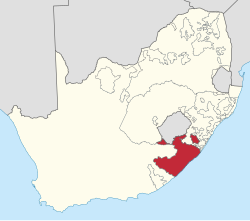
Back Transkei AF Transkei AST ترانسکی AZB Транскей BA Transkei Catalan Transkei Czech Transkei Danish Transkei German Transkejo EO Transkei Spanish
Republic of Transkei iRiphabliki yeTranskei | |||||||||
|---|---|---|---|---|---|---|---|---|---|
| 1976–1994 | |||||||||
| Motto: iMbumba yaManyama Xhosa: Unity is Strength | |||||||||
| Anthem: Nkosi Sikelel' iAfrika[2] Xhosa: God Bless Africa | |||||||||
 Location of Transkei (red) within South Africa (yellow). | |||||||||
| Status | Bantustan (de facto; independence not internationally recognised) | ||||||||
| Capital | Umtata | ||||||||
| Common languages | Xhosa (official) –Sesotho and English translations required for laws to come into effect –Afrikaans allowed in administration and judiciary¹ | ||||||||
| Leader | |||||||||
• 1976–1986 | Chief Kaiser Daliwonga Matanzima (Nominal parliamentary democracy, effective one-party rule) | ||||||||
• 1987–1994 | Bantu Holomisa (Military rule) | ||||||||
| Legislature | Parliament | ||||||||
• Parliament | President plus National Assembly (Immune to judicial review)² | ||||||||
• National Assembly | Paramount Chiefs 70 District Chiefs 75 elected MPs³ | ||||||||
| History | |||||||||
• Self-government | 30 May 1963 | ||||||||
• Nominal independence | 26 October 1976 | ||||||||
• Break of diplomatic ties | 1978 | ||||||||
| 1987 | |||||||||
• Foiled coup d'état | 1990 | ||||||||
• Dissolution | 27 April 1994 | ||||||||
| Area | |||||||||
| 1980[3] | 43,798 km2 (16,911 sq mi) | ||||||||
| Population | |||||||||
• 1980[3] | 2,323,650 | ||||||||
| Currency | South African rand | ||||||||
| |||||||||
1. Constitution of the Republic of Transkei 1976, Chapter 3, 16/Chapter 5, 41 2. Constitution of the Republic of Transkei, Chapter 5, 24(4): "No court of law shall be competent to inquire into or to pronounce upon the validity of any Act." 3. 28 electoral divisions; number of MPs per division in proportion to number of registered voters per division; at least one MP each | |||||||||
| Historical states in present-day South Africa |
|---|
 |
|
|
Transkei (/trænˈskeɪ, trɑːn-, -ˈskaɪ/ tran-SKAY, TRAHN-, -SKY, meaning the area beyond [the river] Kei), officially the Republic of Transkei (Xhosa: iRiphabliki yeTranskei), was an unrecognised state in the southeastern region of South Africa from 1976 to 1994. It was, along with Ciskei, a Bantustan for the Xhosa people, and operated as a nominally independent parliamentary democracy. Its capital was Umtata (renamed Mthatha in 2004).[4]
Transkei represented a significant precedent and historic turning point in South Africa's policy of apartheid and "separate development"; it was the first of four territories to be declared independent of South Africa. Throughout its existence, it remained an internationally unrecognised, diplomatically isolated, politically unstable de facto one-party state, which at one point broke relations with South Africa, the only country that acknowledged it as a legal entity. In 1994, it was reintegrated into its larger neighbour and became part of the Eastern Cape province.
- ^ Republic of Transkei Constitution Act, 1976.
- ^ "Ciskei – nationalanthems.info".
- ^ Sally Frankental; Owen Sichone (1 January 2005). South Africa's Diverse Peoples: A Reference Sourcebook. ABC-CLIO. p. 187. ISBN 978-1-57607-674-3. Archived from the original on 12 December 2013. Retrieved 18 September 2013.
- ^ Constitution of the Republic of Transkei, Chapter 1, 1(2) (PDF), archived (PDF) from the original on 21 July 2010, retrieved 11 July 2009

![Coat of arms[1] of Transkei](http://upload.wikimedia.org/wikipedia/commons/thumb/f/fa/Coat_of_arms_of_Transkei_2.svg/85px-Coat_of_arms_of_Transkei_2.svg.png)